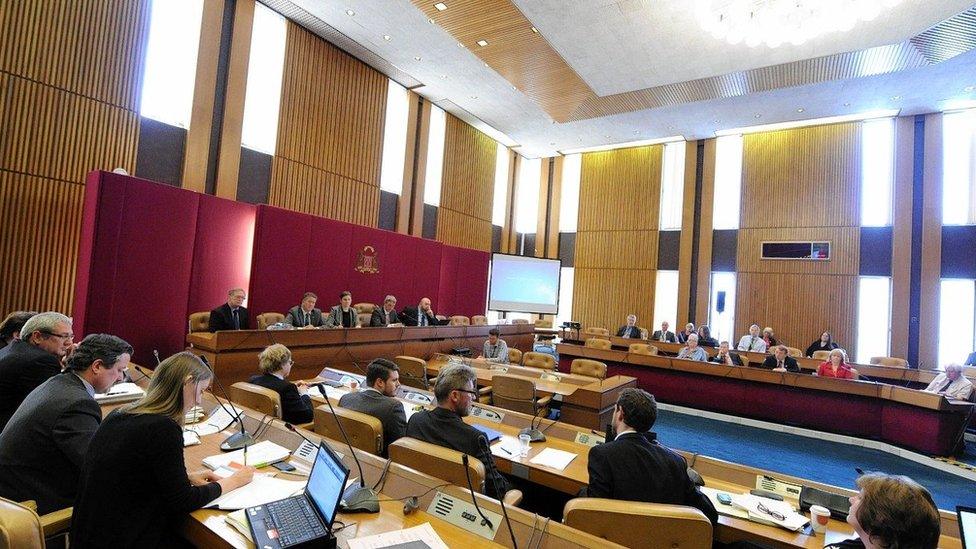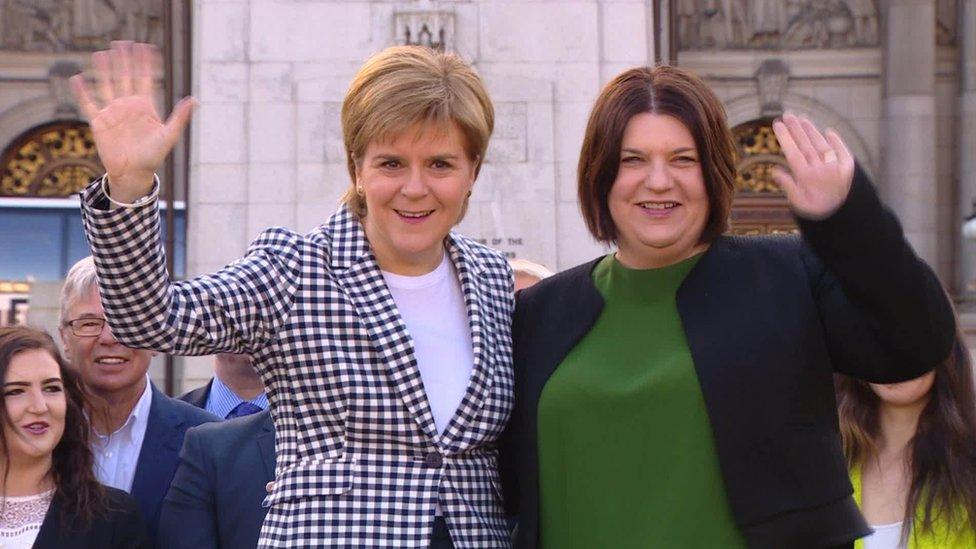Who gets to rule Scotland's new councils - and why?
- Published

In Aberdeen Labour members have been suspended by party chiefs for doing a power-sharing deal with the Conservatives, despite running the previous administration together
Proportional representation generates interesting results. Power does not always end up where voters might expect it to.
In the Scottish council elections on 4 May, none of the 32 local authority's gave a clear-cut result.
No national political party gained a majority on any of the the country's councils.
This inevitably meant deals to secure coalitions or minority administrations.
The SNP were the clear winners in the election polling and returned more councillors than any other party (431).
The Conservatives (276) were the second biggest party, edging ahead of Labour (262).
It has taken some times for councils to work out how they will be run but three weeks on, just a handful of administrations are still to be formed.
Where does power actually lie?

Susan Aitken (right), the new leader of Glasgow City Council, with SNP leader Nicola Sturgeon
The SNP has more councillors than any other group in 16 councils, the Conservatives in 6 and Labour in 3.
A few administrations have still to be formed but the trend so far suggests the SNP has less power in practice than might have been expected while Labour and the Conservatives have more.
Generally the largest local party is either governing as a minority or leading a coalition but there are significant exceptions.
There is no rule which says that the largest local party has to be part of the administration.
Biggest party
The SNP is in opposition in Aberdeen, Argyll and Bute, Angus, Moray and North Lanarkshire even though it is the biggest party on the council.
The Conservatives meanwhile have been left in the cold in Dumfries and Galloway, East Renfrewshire and South Ayrshire.
It can be tricky to assess whether the fact that the SNP and the Conservatives have not formed the administration in some of the areas they "won" is balanced out by power elsewhere.
For instance, the SNP and Labour are in coalition in East Renfrewshire and Dumfries and Galloway and among the partners in the administration in South Ayrshire.
Minority administrations
Meanwhile the Conservatives are the biggest political party in the administrations leading Argyll and Bute, Angus and Moray.
With Labour the overall situation is clearer - while they hold their weakest position in modern times in Scottish local government, it is not as weak as the party may have feared.
Labour were left as the largest party in just three administrations but has secured more influence with minority administrations in North Lanarkshire and North Ayrshire.
Complex patchwork
Overall the SNP are in their strongest ever position in practice in local government - aided by the symbolism of winning the former Labour fortress of Glasgow and many SNP-led administrations in the west of Scotland.
But across Scotland, the deals so far still suggest a very mixed, complex patchwork is emerging with no single party appearing dominant.
The overall national situation matters. It influences the relationship between local and central government.
The Scottish government is due to announce what are likely to be radical proposals on how schools are run after the General Election.
With the SNP in power in more councils, they can expect a more sympathetic hearing than might otherwise have been the case.
But Scottish local government cannot be said to have a dominant party - even if one party is clearly the largest one.

Who is running Scotland's councils?
Aberdeen Council - Labour suspended nine councillors after they agreed a coalition deal with the Conservatives.
Aberdeenshire Council - A coalition of Conservative, Liberal Democrats and independent councillors will run the council.
Angus Council - Conservatives, Independents and Liberal Democrats form administration.
Argyll and Bute Council - Independent, Lib Dem and Conservative coalition
Clackmannanshire - The first meeting of the new council could not agree an administration. They will meet again on 1 June.
Dumfries and Galloway Council - A coalition between Labour and the SNP has taken control, meaning the Conservative group, which won most seats, is kept out of the administration.
Dundee City Council - SNP to form administration with Independent.
East Ayrshire Council - SNP minority administration
East Dunbartonshire Council- An SNP minority administration
East Lothian Council- Labour minority administration
East Renfrewshire Council - The SNP and Labour are set to run the council despite the Conservatives winning the most seats.
Edinburgh Council - No agreement reached. A new administration will not now be formed for at least another week.
Falkirk Council - SNP minority takes control of the council
Fife Council - Joint leadership, with power shared equally between SNP and Labour.
Glasgow - The SNP has formed a minority administration, ending almost 40 years of Labour dominance.
Highland Council - 28 independents along with 10 Lib Dems and three Labour have formed an administration, keeping out the SNP and Tories.
Inverclyde Council - A Labour minority administration
Midlothian Council - Labour will run a minority administration
Moray Council - The Conservative group of eight councillors is to join forces with six of the independent members.
North Ayrshire Council - Labour will continue to run the council despite a surge from the Scottish Conservatives in the local elections. The SNP have the same number of seats as Labour.
North Lanarkshire Council - Labour have formed a minority administration. There will be no formal coalition agreement with the Tories.
Perth and Kinross Council - A Conservative-led coalition with the Lib Dems and Independents.
Renfrewshire Council - will operate as an SNP minority administration.
South Ayrshire Council - A coalition of SNP, Labour and Independent councillors has been formed to run the council.
Scottish Borders - A new Conservative-independent coalition has taken formal control. It was previously an SNP/Lib Dem/independent administration.
South Lanarkshire Council - Labour members abstained in a vote on forming an alliance with the Tories. The SNP took control of the council, with a minority administration.
Stirling Council - The SNP and Labour agree a coalition to run the council as a majority administration
West Dunbartonshire Council - It will be an SNP-Independent administration. The 10 SNP councillors have joined with one of the two independents to form an administration.
West Lothian Council - A Labour minority administration
Western Isles, Orkney and Shetland - All administrations dominated by independents.